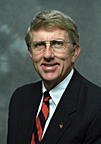December 14, 2005
Recktenwald returning to Sri Lanka to teach
CARBONDALE, Ill. — A Southern Illinois University Carbondale journalism lecturer will teach his craft to students in Sri Lanka at the invitation of the U.S. State Department.William Recktenwald, journalist in residence at SIUC's School of Journalism, will once again visit Sri Lanka, a country that has enchanted him since he began visiting it as a journalism teacher in 2002. Recktenwald will leave in late December.
The former Chicago Tribune reporter nearly lost his life in Sri Lanka a year ago when a catastrophic tsunami rushed ashore at the hotel resort where he was staying. The earthquake-driven wave killed more than a quarter million people in Sri Lanka, Indonesia, Thailand and others.
Recktenwald hopes to see progress toward recovery in the region while he spends about three weeks there teaching journalism and speaking to groups about American media practices. Although he was planning to visit the country again anyway, a phone call from the State Department last month changed those plans – for the better.
"It was a nice surprise," Recktenwald said. "I had planned to return for some vacation. This just meant adding some time to take care of these presentations."
Recktenwald previously visited and taught journalism in Sri Lanka, India and Nepal as part of a team of SIUC journalism teachers. The State Department also funded the 2002-2003 trip.
Recktenwald said he is proud to be invited back.
"I think it speaks well of the feelings the State Department has for the SIUC School of Journalism," he said.
A retired award-winning reporter and deputy bureau chief, Recktenwald teaches basic news writing, investigative reporting and freelance writing at SIUC. The tsunami and its aftermath prompted him to write about his experience for his former paper and others, as well as appear on WSIU-TV, The History Channel and National Public Radio.
Recktenwald most recently visited Sri Lanka in March. Recovery efforts, spurred by massive international aid, are well under way, he said.
"The stories you hear on talk radio about the aid going to line the pockets of dictators are completely false," Recktenwald said. "It was very clear that huge amounts of relief and aid was brought there by many countries, including the U.S."
U.S. Marines cleared roads and debris, making much of the effort feasible. "They are truly heroes to the people there," Recktenwald said.
Recktenwald hopes to do some fresh reporting on the unfolding situation as the region struggles to recover. He plans to interview a British family who is starting a day care center named "Camp Coconut" there. The family, he explained, went through several agonizing hours following the tsunami when they could not find one of their children. Local people kept the child safe and eventually reunited the family.
He also plans to interview owners of the hotel where he was staying when the tsunami hit. They have helped build new houses to replace those washed away by the surf, he said.
Some of his past reports appear on his blog: http://reckman.blogspot.com.
Recktenwald said Sri Lanka is an emerging democracy with a somewhat free press. Journalists there, however, tend to have little formal training. He plans to work with them on basics such as telling all sides of a story, interviewing skills, investigative techniques and using the Internet to find legitimate information.
He's looking forward to getting back.
"I really have come to love the place," he said. "I have a number of friends there now. Disaster has a tendency to make people close."
Leading in research, scholarly and creative activities are among the goals of Southern at 150: Building Excellence Through Commitment, the blueprint the University if following as it approaches its 150th anniversary in 2019.

